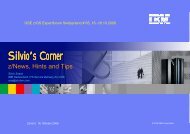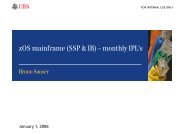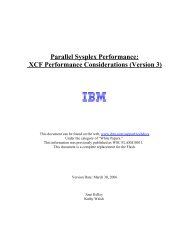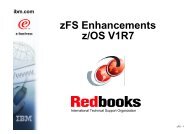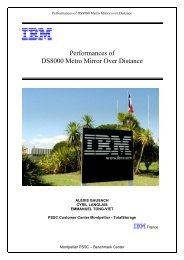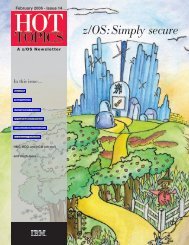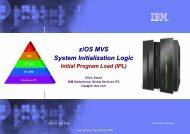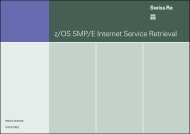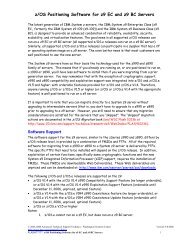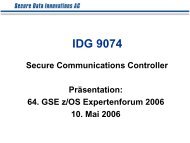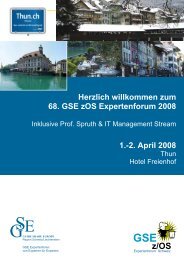Migrating to zOS R8 Part 1 - Messmer The Brain House
Migrating to zOS R8 Part 1 - Messmer The Brain House
Migrating to zOS R8 Part 1 - Messmer The Brain House
You also want an ePaper? Increase the reach of your titles
YUMPU automatically turns print PDFs into web optimized ePapers that Google loves.
<strong>Migrating</strong> <strong>to</strong> z/OS <strong>R8</strong> <strong>Part</strong> 1 of 3: Get Ready<br />
COPYDUMP. If DFSMSdss encounters any large format sequential data sets as input <strong>to</strong><br />
logical data set COPY, logical and physical data set DUMP and RESTORE, data set print, or<br />
logical and physical data set RELEASE, the data set will fail with AD<strong>R8</strong>78E rsn 17.<br />
DFSMShsm: Allows a z/OS V1R6 system <strong>to</strong> <strong>to</strong>lerate the changes made by the fast<br />
replication tape support enhancement in z/OS V1<strong>R8</strong>.<br />
DFSMShsm: In z/OS V1<strong>R8</strong>, dump volume (DVL) and dump class (DCL) control data set<br />
records were enlarged as part of the DFSMShsm dump encryption enhancement. <strong>The</strong> PTF<br />
allows a z/OS V1R6 system <strong>to</strong> <strong>to</strong>lerate the increase in record size.<br />
DFSMShsm: z/OS V1R7 and later support large format sequential data sets. <strong>The</strong> PTFs<br />
cause pre-z/OS V1R7 systems that might potentially recall, recover, or ARECOVER a data<br />
set <strong>to</strong> first verify that the data set is not a large format data set. If it is, an error message is<br />
issued describing the reason for the failure.<br />
DFSMShsm: z/OS V1R7 and later support large format sequential data sets. In an<br />
HSMplex with more than one DFSMShsm host, take care when migrating the journal <strong>to</strong> a<br />
large format sequential data set. All DFSMShsm hosts within an HSMplex must be at z/OS<br />
V1R7 or later before you can migrate the journal <strong>to</strong> a large format sequential data set.<br />
With the PTFs, when a pre-z/OS V1R7 DFSMShsm host attempts <strong>to</strong> open a journal, if the<br />
journal is a standard format data set, DFSMShsm initialization continues. If the journal is a<br />
large format data set, message MSGARC0509E with the "LARGE" text in the message is<br />
issued and DFSMShsm is s<strong>to</strong>pped. If the journal is a striped data set, message<br />
MSGARC0509E with the "STRIPED" text in the message is issued and DFSMShsm is<br />
s<strong>to</strong>pped. If the ARCBJRNL utility attempts <strong>to</strong> use a large format journal data set, it ends with<br />
return code RC40, which indicates an OPEN error.<br />
DFSMShsm: z/OS V1R7 and later support fast subsequent migration (FSM) of data sets.<br />
<strong>The</strong> PTFs cause DFSMShsm <strong>to</strong> set the appropriate flags during recall processing so that if<br />
the data set is later opened for output by either z/OS V1R7 systems or pre-z/OS V1R7<br />
systems, the flags used for reconnection determination are set appropriately.<br />
DFSMShsm: z/OS V1R7 increased the number of data set names supported in a tape table<br />
of contents (TTOC). If a system that has the coexistence PTF installed finds that the OCDS<br />
RECORDSIZE is 6144 bytes, which indicates that some instances of DFSMShsm in the<br />
HSMplex might be using the extended TTOC, then tape operations on that level of<br />
DFSMShsm are inhibited.<br />
DFSMSrmm: Allows a pre-z/OS V1<strong>R8</strong> system in a client/server environment <strong>to</strong> participate<br />
in an RMMplex in which a z/OS V1<strong>R8</strong> system has been started. Optionally, you can specify<br />
UTC(YES) with the EDGUTIL utility on z/OS V1<strong>R8</strong> <strong>to</strong> enable DFSMSrmm common time<br />
support.<br />
DFSMSrmm: Allows a pre-z/OS V1<strong>R8</strong> system <strong>to</strong> participate in an RMMplex in which a<br />
z/OS V1<strong>R8</strong> system has been started. In particular, the PTF enables VRSEL processing <strong>to</strong><br />
recognize the use of the special ABEND and OPEN vital record specifications and <strong>to</strong><br />
correctly handle COUNT(0). It also prevents the continued use of the unsupported options<br />
STARTNUMBER and LOCATION(BOTH).<br />
Distributed File Service: Allows pre-z/OS V1R7 systems <strong>to</strong> <strong>to</strong>lerate new characters (@#$)<br />
allowed in z/OS V1R7 and later for zFS file systems and aggregates.<br />
Distributed File Service: Allows pre-z/OS V1R7 systems <strong>to</strong> <strong>to</strong>lerate the file system<br />
structure for z/OS V1R7 and later zFS file systems.<br />
HCD: Provides support for HCD users who share IODF data sets between pre-z/OS V1R7<br />
systems and z/OS V1R7 or later systems.<br />
ISPF: Allows pre-z/OS V1R7 systems <strong>to</strong> intelligently display the number of tracks in a large<br />
format sequential data set. If the number of tracks is greater than 64 KB, the string ">64K"<br />
and a larger explana<strong>to</strong>ry message are written <strong>to</strong> the panel.<br />
ISPF: Provides an appropriate message when a user attempts <strong>to</strong> open a large format<br />
sequential data set from a pre-z/OS V1R7 release.<br />
UA25404<br />
UA22715<br />
UA16798, UA16953<br />
UA15871, UA16552, UA16956,<br />
UA18496<br />
UA16851, UA16859, UA16862,<br />
UA16946<br />
UA16949<br />
UA25144 if not using client/server<br />
DFSMSrmm, or both UA25144 and<br />
UA00009 if using client/server<br />
DFSMSrmm<br />
UA22044<br />
UA14530<br />
UA20483<br />
UA90174 (base and English),<br />
UA90175 (Japanese)<br />
UA19930, UA20545<br />
UA19933, UA19942 (Swiss<br />
German), UA19943 (Japanese),<br />
SHARE (c) Copyright IBM Corporation, 2006 August 15, 2006<br />
Session 2870 Page 65 of 70 Baltimore, MD



